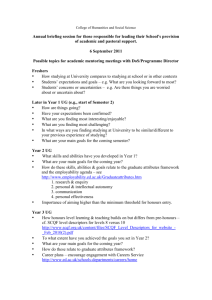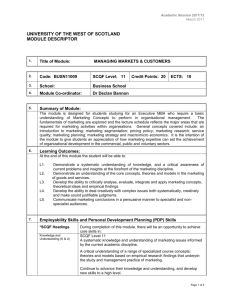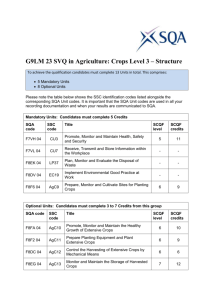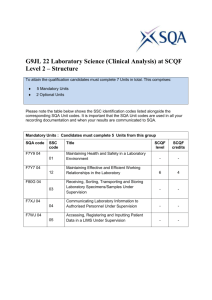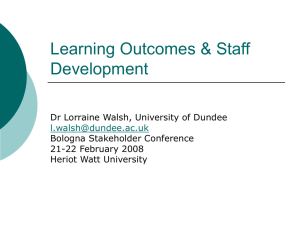NC Social Sciences Group Awards
advertisement
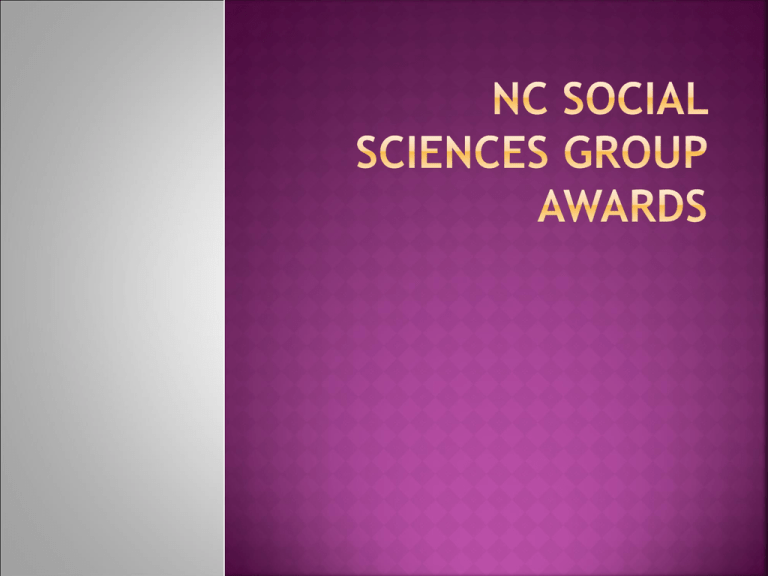
NC Social Sciences Level 5 – GF8C 45 NC Social Sciences Level 6 – GF8M 46 Based on SQA’s Design Principles for NC Group Awards Designed to be compatible with many current NQ level offerings in colleges Lead college: Edinburgh’s Telford Other colleges: Stevenson College; Motherwell College; James Watt College; Jewel and Esk Valley College; Adam Smith College Organisations: Scotland’s Colleges; SWAP; SQA NQ Level courses exist in many colleges HMIE Aspect report 2009 notes range of provision - inconsistent Market research confirmed support for Group Award (email questionnaire plus contact from stakeholders) Target audience – school leavers, adult returners, mature learners –all ages and backgrounds Building in employability To provide candidates with knowledge and skills across specific social science subjects. To develop an understanding of the contribution of social sciences to the modern world and human behaviour. To develop an open-minded, critical and evaluative approach to study. To develop knowledge and understanding of different research methods and skills appropriate for use in the social science discipline which are necessary for progression to further and higher education. To enhance interpersonal skills which are critical in the majority of work situation in social sciences. To provide candidate with opportunities to gain a nationally recognised qualification that will lead to further and higher education and/or employment. To harmonise and standardise the provision at SCQF Levels 5 and 6 in Social Sciences across the FE Sector. 12 SQA credits (72 SCQF credit points) A minimum of 7 need to be at SCQF Level 5 3 mandatory Units (at SCQF Level 5) Psychology: Investigating Behaviour Socialisation Communication plus 4 credits at SCQF Level 5 from social science subjects (including criminology) Plus 0-5 from an optional section that includes other Core Skills, maths, personal development and employability Units, a volunteering award, English & Literature Units, a counselling Unit, external exam credits and a new Psychology Unit. Some of these optional Units are at SCQF level 4, most are at SCQF level 5. 12 SQA credits (72 SCQF credit points) A minimum of 7 need to be at SCQF Level 6 2 mandatory Units (at SCQF Level 6) Psychology: Individual in the Social Context Studying Human Society: The Sociological Approach plus 5 credits at SCQF Level 6 from social science subjects (including criminology) Plus Other optional Units can be more social sciences at SCQF Level 6, some at SCQF level 5 or broader options Broader options includes other Core Skills, personal development and employability Units, a volunteering award, English & Literature Units, external exam credits plus a new Psychology Unit. All Core Skills are included (can be developed and are embedded or signposted). Exit level from NC Social Sciences at SCQF Level 6 will be at SCQF Level 5 across all areas to fit entry level for HNC . Exit level from NC Social Sciences at SCQF Level 5 will be at SCQF Level 4 across all areas. Core Skills can sit outside the Group Award if a Centre chooses – only Communication at NCSS Level 5 is mandatory. Also built in opportunities to develop skills that should help towards employment. Enterprise, Self and Work, Self Awareness, Volunteering, Employability. In terms of citizenship – awards address the aspirations of Curriculum for Excellence (Volunteering, citizenship, enterprise, employability and personal development). The framework could be used alongside SWAP Access to Humanities programme – not official SWAP policy but is compatible. Centres can continue to offer the 18 credits most use for NQ level provision. Could have 12 credits and Group Award overtaken by end block 2 (of 3 x 12 week prog) eg 6 block 1 plus 1 hr tutorial; 6 block 2 plus 1 hr tutorial; 5 block 1 plus 1 hr tutorial. Could be completed in January provision. H1WJ 11 Psychology: Theory and Methods at SCQF level 5. Similar to Introduction to Psychology Unit that was levelled at SCQF level 4 – taught by most at SCQF Level 5. Outcomes 1 Explain theories from major figures in psychology and their application. 2 Describe the main types of research methods used by psychologists. At Level 5 H1WL 11 - Criminology: Crime in the Community Outcomes 1 Describe and categorise common crimes in the community. 2 Identify the role of the media in the perception of crime in the community. 3 Identify measures in place to address crime in the community. H1WK 11- Criminology: Crime Scenes Outcomes 1 Describe crime scene protocol and the range of evidence which may be present. 2 Describe psychological evidence from a crime scene and the nature of offender profiling. H1WM 12 - Criminology: Nature and Extent of Crime Outcomes 1 Describe the nature of crime. 2 Evaluate how crime is measured. H1WN 12 - Criminology: Crime Control Strategies H1WP 12 - Criminology: Forensic Psychology Outcomes 1 Describe the roles of Forensic Psychologists. 2 Evaluate psychological explanations of criminal behaviour. 3 Examine extraordinary criminal behaviour. Any Questions?
